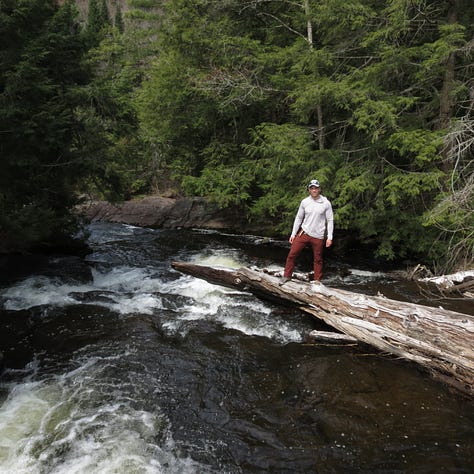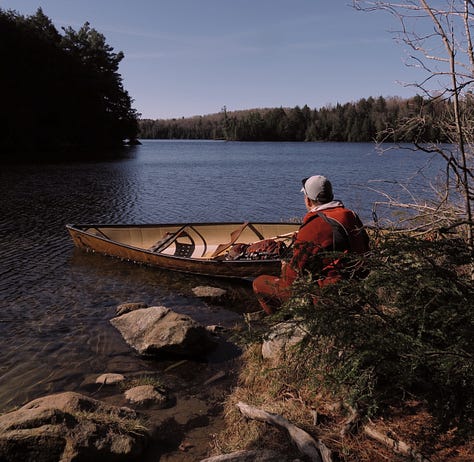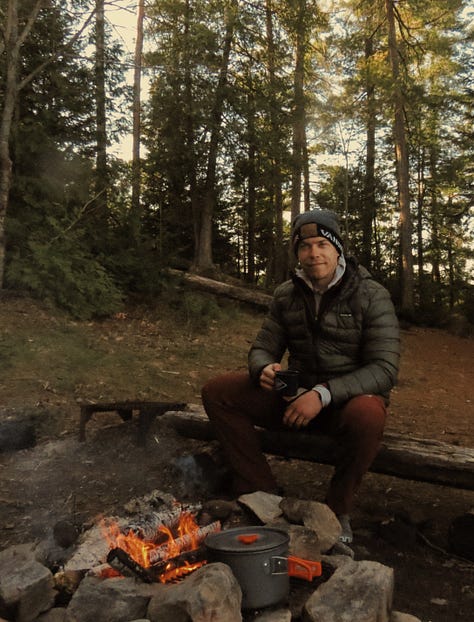Ragged Lake
May 9, 2025
Like a slowly steeping tea, irritation infused further into our voices.
We threw the map back and forth—from the bow of the canoe to the stern—pointing at the jagged coastline and arguing over our orientation in Ragged Lake.
It was midday at the start of May.
My brother, Tommy, and I were in Algonquin Provincial Park on our first ever portage trip—a backcountry camping trip in which you paddle across lakes and carry your canoe over land to travel between waterways.
More familiar with footpaths and new to navigating waters, we hadn’t taken the necessary time to plot a nautical route before launching our canoe into Ragged Lake.
So we ended up not in South Bay, where our next portage was, but adrift in West Bay, disoriented and headed further off course.
Two bald eagles soared in semi-circles overhead, seemingly snickering at another pair of lost paddlers. No matter which way we cocked our heads or turned the map, we couldn’t figure out if the large island punctuating the middle of the lake was in front, behind, or to the side of us.
Bears, wolves, and mountain lions are barely a concern in the backcountry in contrast to the trouble your own ignorance can get you in.
By far, the biggest danger in the woods is going off course and losing all sense of direction.
And we had committed that cardinal sin.
We were lost.
Swirling in my mind as we tried to decipher the map and make sense of the land around us was one last resort I was hoping we wouldn’t become desperate enough to use.
But as the fear of being lost in 8,000 square kilometres of wilderness found its way into the marrow of my bones, I caved.
I muttered to my brother from the back of the canoe, “I’m going to turn on my phone, I might have downloaded offline maps for this area.” As I spoke the words, my aspiring self-image as a weathered woodsman splintered to woodchips inside me.
I unclipped my burnt red 80-litre pack, pulled out the blue waterproof sack stowing our valuables, and turned on my phone.
As a white Apple illuminated the black screen, I murmured a quick prayer that my fuzzy memory of downloading offline maps for all of Ontario wasn’t just a mid-lake delusion.
My phone buzzed to life. No signal, as expected.
My slightly trembling fingers fumbled to Google Maps. I opened the app to an all blue screen. Five seconds passed. Still blue.
I scanned the lake, realizing we might be left to resolve this on our own.
When I looked back down, maps had booted up and a blue beacon showed our pinpointed location. Every muscle in my body that had unconsciously tightened over the preceding minutes relaxed.
We had unknowingly hugged the island for too long, overshooting our turn by twenty minutes.
If Tommy hadn’t had the hunch to check our direction, we could have found ourselves paddling in the dark that night trying to make camp.
With three big backstrokes, I turned us around, pointing the canoe back the way we came. The bald eagles swooped overhead as if seeing us out of their home.
Forty minutes later, we found our portage where the shore met marsh at the narrowing southern end of the lake.
I have a tendency to take things to the extreme.
This helps me in some areas of life.
It enables me to train Brazilian Jiu Jitsu for eight hours a week on top of hour-long workouts every morning.
But it hurts me in others.
I grit my teeth and keep training through arthritic-feeling elbows and an unstable shoulder that’s come close to dislocation more times than I care to count. I know I’ll pay the price later, but I can’t convince myself to rest.
I’ve tried to adopt the motto of “less but better,”1 but the root of me can’t stop living by the slogan, "more is best.”
Doing more is part of my personality.
Downloading offline maps for all of Ontario despite the fact I spend 99% of my time in Toronto is an extension of the part of my character that takes things to the extreme.
If I was pragmatic, I wouldn’t have bothered saving maps for anything outside of the city and its surrounding suburbs. But the part of me that needs to do more urged me, years ago on a day I don’t remember, to spend storage space on offline maps for places I’ll probably never go.
And when we were lost floating in the middle of a remote lake, that part of me saved us.
It may seem like I’m tugging on the thread of a faint connection, but I don’t think it is. At least no more faint than the feelings that tug at us each day that make us us. Many of those feelings may be completely subconscious, or hard to put words to, but they compose our character.
I don’t know why my character, with all its weirdness, intricacies, and preferences, is the way it is.
My propensity to take things to an unnecessary extreme probably stems from childhood feelings of inadequacy that I unknowingly compensated for by always doing more than is necessary.
But if that’s who I am, why not lean into it?
Embrace it?
See it as a strength instead of a deficiency?
Rather than incessantly ironing out my kinks, as some modern-day therapists or self-improvement gurus might suggest, I’d rather embrace the tendencies that make me me.
And I’m learning to listen more.
To listen to the threads that tug at my heart, pulling me in the direction of my character, no matter how nonsensical it may be to the rest of the world.



With love,
Subscribe for new essays every month:
In other news…
I’m back. I missed writing. I plan to start publishing once a month.
Thank you for being here 🤙🏼
From Greg McKeown’s Essentialism.





Welcome back!
Let's. Go.